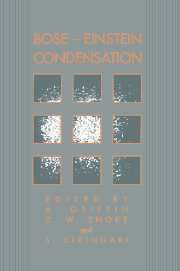Book contents
- Frontmatter
- Contents
- Preface
- Preface to paperback edition
- 1 Introduction: Unifying Themes of Bose–Einstein Condensation
- Part one Review Papers
- Part two Brief Reports
- 20 BEC in Ultra-cold Cesium: Collisional Constraints
- 21 BEC and the Relaxation Explosion in Magnetically Trapped Atomic Hydrogen
- 22 Quest for Kosterlitz–Thouless Transition in Two-Dimensional Atomic Hydrogen
- 23 BEC of Biexcitons in CuCl
- 24 The Influence of Polariton Effects on BEC of Biexcitons
- 25 Light-Induced BEC of Excitons and Biexcitons
- 26 Evolution of a Nonequilibrium Polariton Condensate
- 27 Excitonic Superfluidity in Cu2O
- 28 On the Bose–Einstein Condensation of Excitons: Finite-lifetime Composite Bosons
- 29 Charged Bosons in Quantum Heterostructures
- 30 Evidence for Bipolaronic Bose-liquid and BEC in High-Tc Oxides
- 31 The Dynamic Structure Function of Bose Liquids in the Deep Inelastic Regime
- 32 Possibilities for BEC of Positronium
- 33 Bose–Einstein Condensation and Spin Waves
- 34 Universal Behaviour within the Nozières–Schmitt-Rink Theory
- 35 Bound States and Superfluidity in Strongly Coupled Fermion Systems
- 36 Onset of Superfluidity in Nuclear Matter
- Appendix. BEC 93 Participant List
- Index
34 - Universal Behaviour within the Nozières–Schmitt-Rink Theory
Published online by Cambridge University Press: 15 December 2009
- Frontmatter
- Contents
- Preface
- Preface to paperback edition
- 1 Introduction: Unifying Themes of Bose–Einstein Condensation
- Part one Review Papers
- Part two Brief Reports
- 20 BEC in Ultra-cold Cesium: Collisional Constraints
- 21 BEC and the Relaxation Explosion in Magnetically Trapped Atomic Hydrogen
- 22 Quest for Kosterlitz–Thouless Transition in Two-Dimensional Atomic Hydrogen
- 23 BEC of Biexcitons in CuCl
- 24 The Influence of Polariton Effects on BEC of Biexcitons
- 25 Light-Induced BEC of Excitons and Biexcitons
- 26 Evolution of a Nonequilibrium Polariton Condensate
- 27 Excitonic Superfluidity in Cu2O
- 28 On the Bose–Einstein Condensation of Excitons: Finite-lifetime Composite Bosons
- 29 Charged Bosons in Quantum Heterostructures
- 30 Evidence for Bipolaronic Bose-liquid and BEC in High-Tc Oxides
- 31 The Dynamic Structure Function of Bose Liquids in the Deep Inelastic Regime
- 32 Possibilities for BEC of Positronium
- 33 Bose–Einstein Condensation and Spin Waves
- 34 Universal Behaviour within the Nozières–Schmitt-Rink Theory
- 35 Bound States and Superfluidity in Strongly Coupled Fermion Systems
- 36 Onset of Superfluidity in Nuclear Matter
- Appendix. BEC 93 Participant List
- Index
Summary
Abstract
We show that the natural variable to follow the crossover from Cooper-pair-based superconductivity to Bose–Einstein condensation within the model of Noziéres and Schmitt-Rink is the product kFξ, where kF is the Fermi wave vector and ξ, is the coherence length for two-electron correlation. In terms of this product, the results of the model do not depend on the detailed form of the (separable) pairing potential, and the crossover turns out to be restricted to the universal region π−1≲kFξ ≲ 2π. Experimental estimates indicate that kFξ ≈10 (> 2π) for high-Tc superconductors.
Evolution from weak to strong coupling superconductivity has been considered by Nozières and Schmitt-Rink [1] (hereafter referred to as NSR) following the pioneering work by Leggett [2]. After the discovery of high- Tc superconductivity, the interest in this problem has grown, and many papers on this subject have appeared [3]. In the present work, we show that working within the simplified treatment by NSR, it is already possible to isolate the essential features of the crossover.
Central to the work of NSR and Leggett is the argument [4] that the BCS wave function has the Bose–Einstein condensation (BEC) built in as a limiting case. (See the review by Randeria in this volume.) NSR study the evolution from BCS to BEC through the increase of the coupling strength associated to an effective fermionic attractive potential, and conclude that the evolution is “smooth”.
Information
- Type
- Chapter
- Information
- Bose-Einstein Condensation , pp. 569 - 573Publisher: Cambridge University PressPrint publication year: 1995
